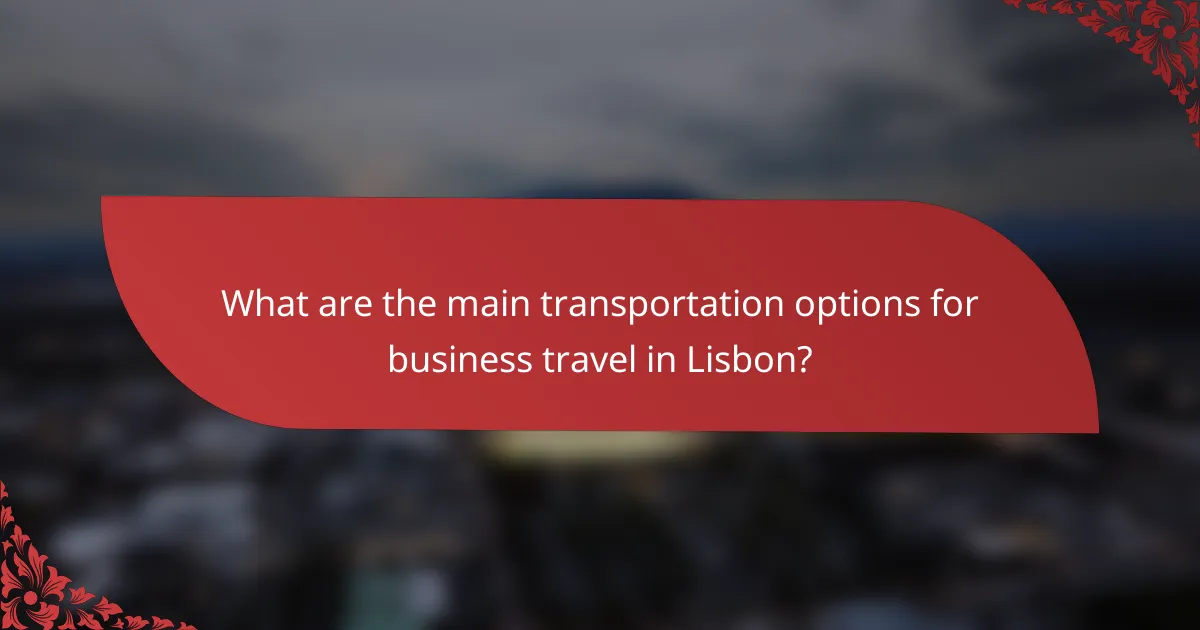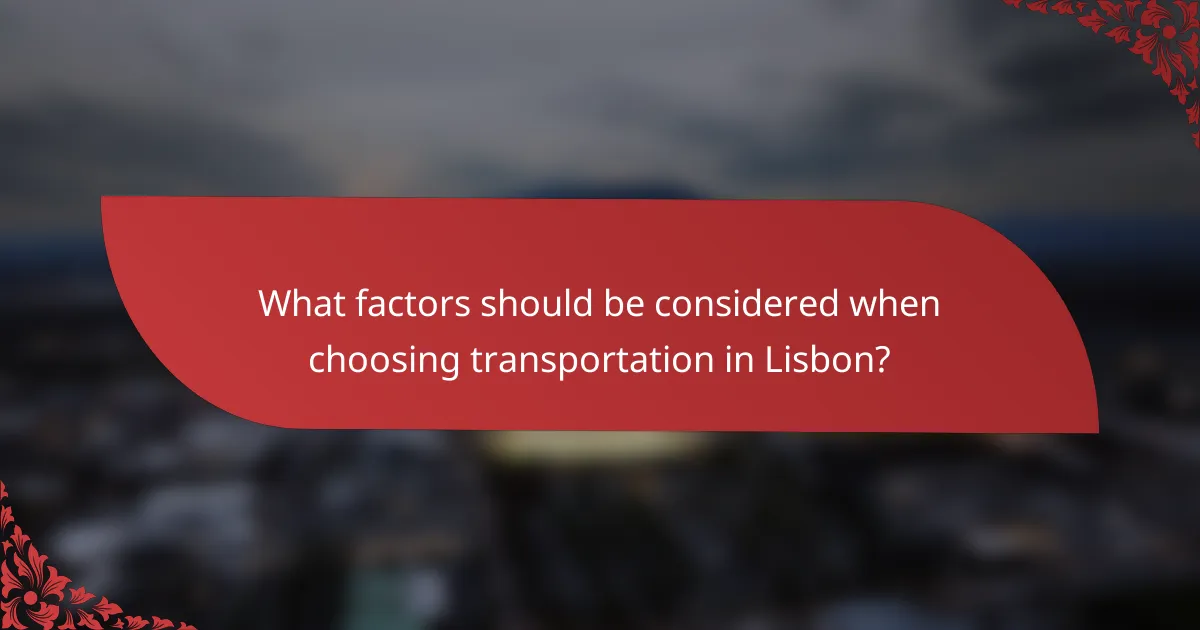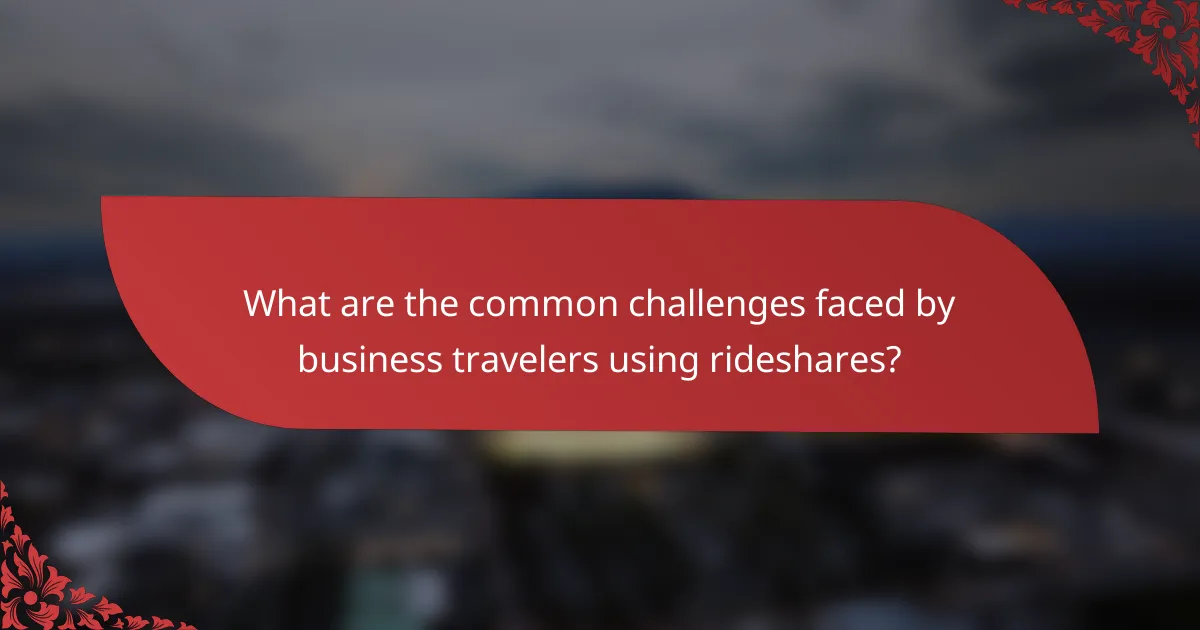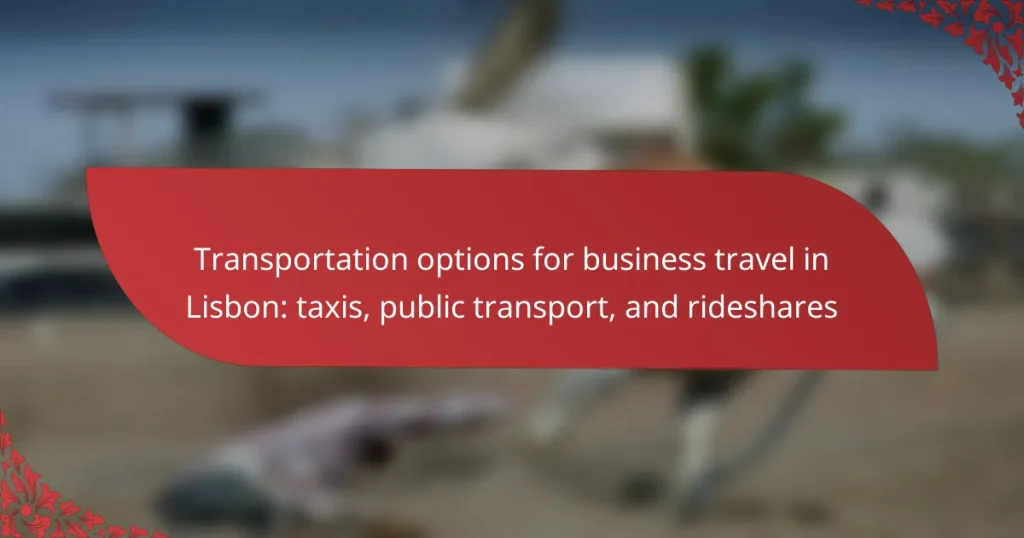Navigating business travel in Lisbon can be streamlined with the right transportation options. Taxis offer direct service and local insights, while public transit provides economical routes through the city. Rideshare services enhance flexibility with easy app-based bookings. Each option presents unique benefits to suit different travel needs and budgets.

What are the main transportation options for business travel in Lisbon?
Lisbon offers various transportation options for business travel, including taxis, public transit, and rideshares. Taxis provide convenience with door-to-door service, while public transit offers cost-effective solutions through buses, trams, and the metro. Rideshare services like Uber enhance flexibility and ease of use, allowing for quick bookings via mobile apps. Each option caters to different preferences, balancing speed, cost, and convenience for business travelers.
How do taxis operate in Lisbon for business travelers?
Taxis in Lisbon operate efficiently for business travelers, providing a reliable mode of transportation. They are metered, ensuring transparent pricing, and can be hailed on the street or booked via apps. Taxis are typically available 24/7, making them convenient for early flights or late meetings. Business travelers can expect a comfortable ride with professional drivers familiar with the city’s layout.
What are the benefits of using public transit for business travel?
Using public transit for business travel offers cost savings, efficiency, and environmental benefits. Public transit reduces travel expenses compared to taxis and rideshares. It provides reliable schedules, minimizing delays. Additionally, public transit contributes to lower carbon footprints, supporting sustainable business practices.
How do rideshare services compare to traditional taxis?
Rideshare services often provide more convenience and flexibility compared to traditional taxis. Rideshares like Uber and Lyft allow users to book rides via apps, track drivers, and often enjoy lower fares. Taxis, while regulated and reliable, may have limited availability and fixed rates. Rideshare services typically offer a wider range of vehicle options, including shared rides for cost savings. In Lisbon, rideshare services can be particularly advantageous during peak hours when taxis may be harder to find.

What factors should be considered when choosing transportation in Lisbon?
When choosing transportation in Lisbon for business travel, consider cost, convenience, time efficiency, and accessibility. Taxis offer direct routes but can be expensive. Public transit is cost-effective and efficient, especially during peak hours. Rideshares provide flexibility and ease of use, often with competitive pricing. Evaluate each option based on your specific travel needs and schedule.
How does cost influence transportation choices for business travelers?
Cost significantly influences transportation choices for business travelers in Lisbon, affecting decisions on taxis, public transit, and rideshares.
Taxis offer convenience but can be expensive, especially during peak hours. Public transit is more economical, providing affordable options like buses and trams. Rideshares present a middle ground, with variable pricing based on demand.
Business travelers often prioritize cost-effectiveness while balancing time efficiency. For instance, public transit may save money but requires more time, while taxis provide speed at a higher cost.
Ultimately, the choice hinges on individual budgets and travel priorities, shaping the overall business travel experience in Lisbon.
What are the time efficiency considerations for different transportation modes?
Taxis offer the quickest door-to-door service, while public transit is cost-effective but may involve longer wait times. Rideshares provide a balance of convenience and speed. Each mode’s efficiency varies based on traffic conditions and distance.
How does convenience impact the choice of transportation?
Convenience significantly influences the choice of transportation for business travel in Lisbon. Taxis offer immediate availability and direct routes, making them ideal for time-sensitive meetings. Public transit, while cost-effective, may require more planning and transfers, which could detract from convenience. Rideshares combine the benefits of taxis and public transit, providing quick access while often being more affordable than traditional taxis. Overall, the ease of access and time efficiency are critical factors in selecting transportation options in Lisbon.

What are the unique features of taxis in Lisbon?
Taxis in Lisbon feature distinctive colors, efficient meter systems, and a unique design. They are typically black and yellow, making them easily recognizable. Taxis offer a flat rate for airport transfers, which simplifies pricing for travelers. Additionally, many taxis are equipped with credit card payment options, enhancing convenience. The drivers often possess extensive local knowledge, providing valuable insights for business travelers.
What payment methods are accepted by taxis?
Taxis in Lisbon accept various payment methods, including cash, credit cards, and mobile payments. Most taxis have card readers, allowing passengers to pay with Visa, Mastercard, and other major cards. Additionally, some taxis support mobile payment apps like Apple Pay and Google Pay. Cash remains a common option, especially for shorter rides.
How do taxi fares vary based on time and distance?
Taxi fares in Lisbon vary based on both time and distance, with rates increasing during peak hours and for longer trips. Fares typically include a base fare plus a per-kilometer charge. Nighttime rates may also apply. For example, a trip of 5 kilometers during the day may cost around 10 euros, while the same trip at night could be 15 euros due to the higher rate. Factors like traffic and waiting time can further influence the final fare.

What are the rare attributes of public transit in Lisbon?
Public transit in Lisbon features rare attributes such as unique tram routes, historical significance, and integration with scenic views. The iconic Tram 28 offers a distinctive journey through historic neighborhoods. Additionally, the public transit system includes a funicular, elevating riders in steep areas, which is uncommon in many cities. Another rare aspect is the accessibility of the network, accommodating different needs, which enhances user experience. Lastly, the sustainability initiatives in Lisbon’s public transit promote eco-friendly travel options, setting it apart from other urban transit systems.
What special services are available for business travelers on public transit?
Business travelers in Lisbon can access special services on public transit, including priority seating, luggage assistance, and dedicated business travel routes. These services enhance convenience and efficiency for professionals on the go. Public transit options, such as buses and trams, often feature real-time updates and Wi-Fi connectivity, catering specifically to business needs. Additionally, some transit lines provide express services to major business districts, ensuring timely arrivals for meetings and events.

What are the common challenges faced by business travelers using rideshares?
Business travelers using rideshares in Lisbon often face challenges like surge pricing, limited availability during peak hours, and navigation issues. Additionally, language barriers can complicate communication with drivers. Traffic congestion can lead to longer wait times and delays. Lastly, safety concerns regarding vehicle quality and driver reliability may arise.
How do surge pricing and availability affect rideshare options?
Surge pricing and availability significantly influence rideshare options in Lisbon. During peak demand, fares increase, potentially making rides less accessible. This pricing model encourages drivers to work during busy times, enhancing availability. In contrast, low-demand periods result in lower fares, benefiting travelers. Understanding these dynamics helps business travelers plan their transportation effectively.
What safety measures should business travelers consider when using rideshares?
Business travelers should prioritize safety by following specific measures when using rideshares. Always verify the driver’s identity and vehicle details before entering the car. Use trusted rideshare apps that provide safety features like GPS tracking and in-app emergency contacts. Share your ride details with a colleague or family member to enhance security. Opt for rides during daylight hours when possible, and avoid sharing personal information with the driver. Familiarize yourself with local emergency numbers and the rideshare company’s policies on safety incidents.

What best practices should business travelers follow when selecting transportation in Lisbon?
Business travelers in Lisbon should prioritize convenience, cost, and efficiency when selecting transportation. Taxis offer direct routes and are widely available, while public transit is economical and connects key areas. Rideshares provide flexibility and ease of use, often with competitive pricing. Consider peak hours and potential traffic to optimize travel time. Each option has unique benefits tailored to different preferences and budgets.
How can travelers optimize their transportation choices for efficiency and cost?
Travelers can optimize transportation choices in Lisbon by comparing taxis, public transit, and rideshares for cost and efficiency.
Taxis offer convenience but can be expensive, especially during peak hours. Public transit, including buses and trams, is budget-friendly and efficient, with a comprehensive network covering the city. Rideshares provide flexibility and may be cost-effective for groups or late-night travel.
Travelers should consider their itineraries and peak travel times to choose the best option. For instance, public transit is often faster during rush hours, while taxis may be quicker late at night.
What are the common mistakes to avoid when using transportation services in Lisbon?
Common mistakes to avoid when using transportation services in Lisbon include not knowing the fare structure, neglecting to use official taxi services, and overlooking public transit schedules.
Many travelers underestimate the importance of confirming taxi rates before starting a journey. Official taxis operate with meters, while rideshares may have variable pricing. Failing to download transit apps can lead to confusion over bus and tram schedules, causing delays.
Another common error is ignoring peak hours, which can significantly affect travel time. Additionally, not validating public transit tickets can result in fines. Understanding these aspects enhances the efficiency of transportation options for business travel in Lisbon.




